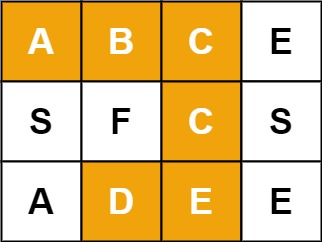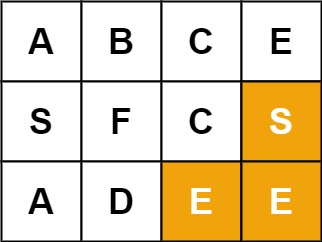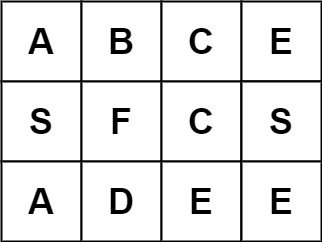Medium
Given an m x n grid of characters board and a string word, return true if word exists in the grid.
The word can be constructed from letters of sequentially adjacent cells, where adjacent cells are horizontally or vertically neighboring. The same letter cell may not be used more than once.
Example 1:
Input: board = [["A","B","C","E"],["S","F","C","S"],["A","D","E","E"]], word = "ABCCED"
Output: true
Example 2:
Input: board = [["A","B","C","E"],["S","F","C","S"],["A","D","E","E"]], word = "SEE"
Output: true
Example 3:
Input: board = [["A","B","C","E"],["S","F","C","S"],["A","D","E","E"]], word = "ABCB"
Output: false
Constraints:
m == board.lengthn = board[i].length1 <= m, n <= 61 <= word.length <= 15boardandwordconsists of only lowercase and uppercase English letters.
Follow up: Could you use search pruning to make your solution faster with a larger board?
#include <vector>
class Solution {
static constexpr char TOMBSTONE = '#';
const vector<pair<int, int>> adj_deltas = {
{1, 0}, {-1, 0}, {0, 1}, {0, -1}
};
bool is_valid(const vector<vector<char>>& board, int r, int c) {
return r >= 0 && r < board.size() && c >= 0 && c < board[0].size() && board[r][c] != TOMBSTONE;
}
bool dfs(vector<vector<char>>& board, string_view w, int r, int c) {
if (w.empty() || (w.size() == 1 && w[0] == board[r][c])) {
return true;
}
if (w[0] != board[r][c]) {
return false;
}
bool res = false;
board[r][c] = TOMBSTONE;
for (auto& d : adj_deltas) {
if (int rr = r + d.first, cc = c + d.second; is_valid(board, rr, cc)) {
res |= dfs(board, w.substr(1), rr, cc);
}
}
board[r][c] = w[0];
return res;
}
public:
bool exist(vector<vector<char>>& board, string_view word) {
// pruning #1
// board has enough letters for word
if (board.size() * board[0].size() < word.size()) {
return false;
}
// pruning #2
// all letters in word exist on board
unordered_map<char, int> board_freq;
for (int r = 0; r < board.size(); r++) {
for (int c = 0; c < board[0].size(); c++) {
board_freq[board[r][c]]++;
}
}
unordered_map<char, int> word_freq;
for (char ch : word) {
if (++word_freq[ch] > board_freq[ch]) {
return false;
}
}
// pruning #3
// all adjacent letters in word exist on board
// it can be merged with pruning #2, but it's still faster than 100%
unordered_map<char, unordered_set<char>> adj_letters;
for (char ch : word) {
adj_letters[ch] = {};
}
for (int r = 0; r < board.size(); r++) {
for (int c = 0; c < board[0].size(); c++) {
if (!adj_letters.count(board[r][c])) {
continue;
}
auto& st = adj_letters[board[r][c]];
for (auto& d : adj_deltas) {
if (int rr = r + d.first, cc = c + d.second; is_valid(board, rr, cc)) {
st.insert(board[rr][cc]);
}
}
}
}
for (int i = 0; i < word.size(); i++) {
if (i > 0 && adj_letters[word[i]].count(word[i - 1]) == 0) {
return false;
}
if (i + 1 < word.size() && adj_letters[word[i]].count(word[i + 1]) == 0) {
return false;
}
}
// full dfs scan otherwise
for (int r = 0; r < board.size(); r++) {
for (int c = 0; c < board[0].size(); c++) {
if (dfs(board, word, r, c)) {
return true;
}
}
}
return false;
}
};



